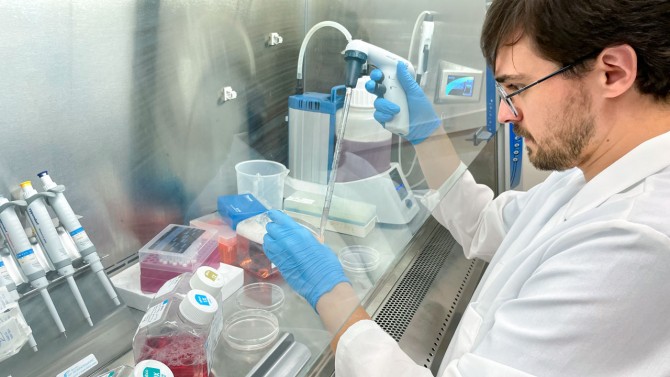Mann award winner unveils evolution, rules of gene expression
By Krishna Ramanujan
Graduate student Julius Judd seeks to answer fundamental questions about how cells in an organism can all have the same genes, and yet have specialized functions. The answers lie in genetic elements that turn some genes on and others off to give cells their unique characteristics.
For his passion, knowledge and ingenuity in his field, Judd, a fourth-year doctoral student in the graduate field of molecular biology and genetics, has been selected for the 2021 Harry and Samuel Mann Outstanding Graduate Student Award.
The honor, now in its ninth year, comes with a $20,000 prize and is given to a graduate student in molecular biology and genetics.
“Over our combined 58 years as principal investigators, we have been privileged to work with many gifted and inspiring trainees, but it is already apparent that Julius is a stand-out,” his faculty advisers, Cedric Feschotte, professor of molecular biology and genetics, and John Lis, the Barbara McClintock Professor of Molecular Biology and Genetics, wrote in a joint nomination letter to the Mann award review committee.
“It’s a huge honor,” Judd said of the award. “And it’ll be transformative for my research. It gives me some freedom as a young researcher to pursue the questions that I’m most interested in.”
Judd said his research leverages the power of genomic technologies that allow him to measure which genes are being expressed in all cells simultaneously. The data provides a window into genes that are active in different cell types. “I’ve done this in a variety of eukaryotic organisms: human, mouse, fruit fly, bat,” he said. “My work is kind of unique in that it’s not restricted to one organism or one problem.”
In Lis’ lab, he researches the mechanisms that regulate transcription, the process through which genetic codes from DNA are copied onto RNA in order to make proteins, and a key step that controls when and where genes get expressed. In Feschotte’s lab, Judd investigates genetic elements called transposons, which make up half of human DNA, and can replicate and insert themselves into genetic code. Transposons can create new genes, adapt others or affect how genes are regulated. Judd explores how transposons fuel the evolution of regulatory networks that control the expression of genes. “The intersection of those is where I work,” he said, “which is using those transposons as a model system to understand more fine-grained mechanisms by which transcriptional regulation happens.”
Judd received his bachelor’s degree in biochemistry and molecular biology at the State University of New York, Albany, in 2015. He began his doctoral program at Cornell in 2017. Among other honors, he has received the Ruth L. Kirschstein National Research Service Award from the National Institutes of Health.
Established in 2012 by Thomas Mann ’64 and Diann Mann ’66, and Cornell parents Jeanne (Mann) Newman and Gary Newman, the award honors Harry and Samuel Mann, the children of Russian immigrants and some of the earliest commercial suppliers of biochemicals for life science research.
“We were fortunate that our fathers understood the importance of the life sciences many decades ago,” said Thomas Mann ’64, Samuel’s son. “Today the pandemic has underlined the need to support the work of bright young researchers like Julius. It is probable that they hold our future in their minds and hands.”
Media Contact
Get Cornell news delivered right to your inbox.
Subscribe

